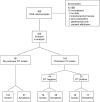Evaluation of a fecal immunochemistry test prior to colonoscopy for outpatients with various indications
- PMID: 29184430
- PMCID: PMC5689031
- DOI: 10.2147/CEG.S147928
Evaluation of a fecal immunochemistry test prior to colonoscopy for outpatients with various indications
Abstract
Background: Stool tests can predict advanced neoplasms prior to colonoscopy. Results of immunochemical stool tests to predict findings at colonoscopy for various indications are less often reported. We compared pre-colonoscopy stool tests with findings in patients undergoing colonoscopy for different indications.
Patients and methods: Charts of patients undergoing elective or semi-urgent colonoscopy were reviewed. Comparison of adenoma detection rates and pathological findings was made between prescreened and non-prescreened, and between stool-positive and stool-negative cases. Demographics, quality of colonoscopy, and pathological findings were recorded. Odds ratios (ORs) and 95% confidence intervals (CIs) were assessed. Statistical significance was accepted at p≤0.05.
Results: Charts of 325 patients were reviewed. Among them, stool tests were done on 144 patients: 114 were negative and 30 were positive. Findings were similar in the pretest and non-pretest groups. Detection of advanced adenomas per patient was higher in the stool-positive group compared to the stool-negative group (23.4% vs 3.5%, p=0.0016, OR =7.6 [95% CI: 2-29.3]). Five advanced adenomas (without high-grade dysplasia or adenocarcinoma) and several cases of multiple adenomas were missed in the negative group. Sensitivity and specificity for advanced polyps was 63.6% and 82.7%, respectively. The negative predictive value was 96.5%. Male gender was independently predictive of any adenoma.
Conclusion: The stool immunochemical test best predicted advanced neoplasms and had a high negative predictive value in this small cohort. Whether this test can be applied to determine the need for colonoscopy in groups other than average risk would require more studies.
Keywords: blood; colonoscopy; fecal; outcome; risks.
Conflict of interest statement
Disclosure The authors report no conflicts of interest in this work.
Figures

References
-
- Torre LA, Bray F, Siegel RL, et al. Global cancer statistics, 2012. CA Cancer J Clin. 2015;65(2):87–108. - PubMed
-
- Hewitson P, Glasziou P, Watsin E, Towler B, Irwig L. Cochrane systematic review of colorectal cancer screening using the fecal occult blood test (hemocult): an update. Am J Gastroenterol. 2008;103(6):1541–1549. - PubMed
-
- Piper MA, Perdue LA, et al. Screening for colorectal cancer: updated evidence report and systematic review for the US preventive services task force. JAMA. 2016;315(5):2576–2594. - PubMed
-
- Inadomi JM. Screening for colorectal neoplasia. N Engl J Med. 2017;376(6):149–156. - PubMed
-
- Levi Z, Rozen P, Hazazi R, et al. Quantitative immunochemical fecal occult blood test for colorectal neoplasia. Ann Intern Med. 2007;146(4):244–255. - PubMed
LinkOut - more resources
Full Text Sources
Other Literature Sources

